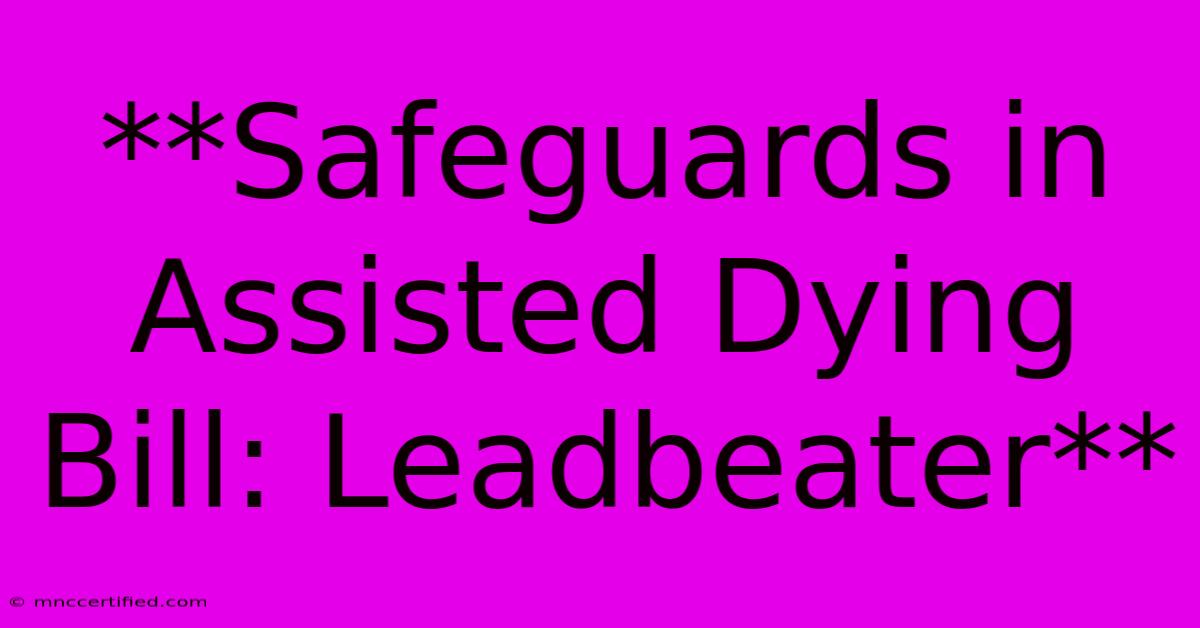**Safeguards In Assisted Dying Bill: Leadbeater**

Table of Contents
Safeguards in Assisted Dying Bill: Leadbeater's Perspective
The Assisted Dying Bill has sparked heated debates and raised concerns about the ethical and practical implications of legalizing assisted dying. One of the key areas of discussion revolves around the safeguards put in place to protect vulnerable individuals and ensure the procedure is implemented ethically and responsibly.
MP for Brent South, Dawn Butler, has highlighted the need for robust safeguards, particularly for people from marginalized communities, who may face additional pressures or be more vulnerable to coercion. These safeguards are crucial for ensuring that assisted dying is a genuine choice, not a result of undue influence or vulnerability.
Leadbeater, a vocal advocate for assisted dying legislation, acknowledges the importance of these safeguards. He argues that they are essential to protect both the individual seeking assisted dying and the wider community.
What Safeguards Are in Place?
The proposed Assisted Dying Bill includes a number of safeguards, which are designed to:
- Ensure informed consent: This involves ensuring that the individual seeking assisted dying fully understands the nature and implications of their request. This includes understanding the alternatives to assisted dying, the potential risks and side effects, and the impact on their loved ones.
- Protect vulnerable individuals: The Bill includes provisions to safeguard vulnerable individuals, such as those with mental health conditions or cognitive impairments, from being pressured into seeking assisted dying. This includes requiring multiple consultations with healthcare professionals, including a psychiatrist or psychologist, to ensure that the individual's decision is truly informed and voluntary.
- Prevent abuse: The Bill includes provisions to prevent abuse, such as requiring two independent medical professionals to confirm that the individual meets the eligibility criteria for assisted dying. This helps ensure that the request is not motivated by coercion or undue influence.
- Provide oversight and accountability: The Bill establishes an independent body to oversee the implementation of assisted dying, including monitoring the number of requests, the reasons for refusal, and the safety of the process. This body will be responsible for ensuring that the process is conducted ethically and safely.
Leadbeater's Stance on Safeguards
Leadbeater believes that the safeguards in the Assisted Dying Bill are comprehensive and provide a robust framework for ensuring that the process is safe and ethical. He argues that the safeguards are essential to protect both the individual seeking assisted dying and the wider community. He is confident that these safeguards will prevent the abuse of the process and ensure that it is used only by individuals who genuinely want to end their lives on their own terms.
The Ongoing Debate
While the safeguards included in the Assisted Dying Bill are a significant step forward, the debate surrounding their effectiveness and the potential for abuse continues. Some critics argue that the safeguards are not sufficient to prevent the exploitation of vulnerable individuals. They highlight the difficulty in ensuring that individuals are truly making their own decisions, particularly in cases of mental illness or cognitive impairment.
Others argue that the safeguards are too burdensome and will make it difficult for people to access assisted dying. They believe that the process should be more streamlined and accessible, particularly for individuals who are experiencing significant pain and suffering.
Conclusion
The debate over the Assisted Dying Bill is complex and multifaceted. The safeguards included in the Bill are designed to ensure that assisted dying is a safe and ethical option for individuals who want to end their lives on their own terms. Leadbeater, a strong advocate for the bill, believes that the safeguards are comprehensive and provide a robust framework for protecting both the individual seeking assisted dying and the wider community. However, the effectiveness of the safeguards and the potential for abuse remain points of contention.
It is crucial to continue the discussion about assisted dying and the safeguards in place to ensure that the process is implemented ethically and responsibly, benefiting both the individual and society as a whole.

Thank you for visiting our website wich cover about **Safeguards In Assisted Dying Bill: Leadbeater**. We hope the information provided has been useful to you. Feel free to contact us if you have any questions or need further assistance. See you next time and dont miss to bookmark.
Featured Posts
-
Wrexham Secures Efl Trophy Win Falls In Shootout
Nov 13, 2024
-
Bucks Dominate Raptors 99 85 Nov 12 Game
Nov 13, 2024
-
Life Insurance Blood Pressure Chart
Nov 13, 2024
-
Captive Insurance Vs Self Insurance
Nov 13, 2024
-
Does Insurance Pay For Nutritionist
Nov 13, 2024